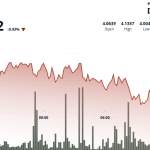Australia Cracks Down on Crypto ATM Scams Targeting Elderly
Australian Federal Police (AFP) has initiated a crackdown on the criminal misuse of cryptocurrency ATMs (crypto ATMs), identifying over 90 individuals connected to scams targeting the elderly, including a harrowing case involving an elderly widow scammed out of AUD 433,000 in an online dating investment fraud.
Facing public broadcaster ABC, AUSTRAC, Australia’s financial intelligence agency, confirmed one victim was a 77-year-old widow scammed during an online dating encounter. The widow allegedly lost AUD 433,000 (approximately $281,947 USD) after being persuaded to invest in Bitcoin.
The victim, lured by a Belgian man met online two years prior, stated she became unaware she was being scammed until police visited her home.
“Half day’s work” to send scammer cash
Scammed during her interactions on a dating app, the victim was encouraged by the alleged scammer to invest in Bitcoin. According to reports, the scammer showcased fabricated documents seemingly demonstrating significant weekly returns.
Initially guided through the transaction process, which involved withdrawing funds using standard ATMs and depositing them into a Bitcoin ATM, the victim reportedly sent her entire life savings over an 18-month period. She once carried “20,000 Australian dollars worth of cash,” comparing the transfers to taking “half a day’s work,” and described becoming “quite expert at using the Bitcoin ATM.”
“The worst part was having to tell my daughter that I’d actually given my life savings, that had taken me 40 years to earn, and it took him 18 months to get.”
AUSTRAC CEO Brendan Thomas further detailed the scope, mentioning a “task force identifying another woman in her 70s,” duped through a fake advertisement promising lucrative returns from a trading firm. This victim reportedly lost over AUD $200,000.
Police Charge One, Issue Caution to Others
Operationally, the AFP targeted top users of crypto ATMs flagged as high-risk for illicit activity or scam involvement, contacting approximately 21 individuals perceived as either victims or facilitators of wrongdoing.
Thomas commented on the outcome, noting a disturbing trend: “We suspected that a large volume of crypto ATM transactions were probably illicit, but disturbingly our law enforcement partners found that almost all of the transactions we referred involved victims rather than criminals.”
Law enforcement action resulted in one individual being charged with property laundering offenses. Four others received formal cautions due to suspicion they were using crypto ATMs to purchase illicit substances or acting as money mules.
Notably, some individuals aided by crypto ATMs were suspected mules but were themselves victims, having either inadvertently assisted criminals or deliberately transferred funds to recover their stolen money. In some cases, suspects resisted admitting they had been duped.
Regulatory Tightening Follows Clampdown
This recent crackdown follows regulatory action by AUSTRAC, which implemented new operating rules and transaction limits for crypto ATM operators effective June 3, aiming to mitigate scam risks. The agency previously identified cryptocurrency as a key priority area for 2025.
Fake Promises Fuel Crypto Scams
AFP Commander Graeme Marshall highlighted the modus operandi: victims are manipulated into funding crypto ATMs with thousands of dollars through deceptions promising love, employment, investment returns, or unrealistic quick profits.
“We need to get the message out there: if someone, a business or a government agency asks you to pay using cryptocurrency, do not send money.”
Marshall advised heightened caution, emphasizing the need to cease contact immediately if promises of quick profits, high-pressure deadlines, or interactions with unknown persons preceding financial transactions occur.
AFTA cited data showing the Australian online cybercrime reporting system, ReportCyber, logged 150 unique scam reports involving crypto ATMs between January 2024 and January 2025, resulting in losses exceeding AUD 3.1 million ($2 million USD).












